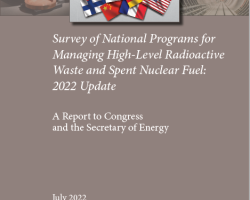Category of Content
Siting Experience Documents Only
Publication Date
Subject Matter
Uncertainty Quanti?cation of Environmentally Assisted Stress Corrosion Cracking in Used Fuel Canisters
Uncertainty Quanti?cation of Environmentally Assisted Stress Corrosion Cracking in Used Fuel Canisters
Review of NDE Methods for Detection and Monitoring of Atmospheric SCC in Welded Canisters for the Storage of Used Nuclear Fuel
Review of NDE Methods for Detection and Monitoring of Atmospheric SCC in Welded Canisters for the Storage of Used Nuclear Fuel
Crack Growth Rate and Large Plate Demonstration of Chloride-induced Stress Corrosion Cracking in Spent Nuclear Fuel Storage Canisters
Crack Growth Rate and Large Plate Demonstration of Chloride-induced Stress Corrosion Cracking in Spent Nuclear Fuel Storage Canisters
Continued Investigations of Respirable Release Fractions for Stress Corrosion Crack-Like Geometries
Continued Investigations of Respirable Release Fractions for Stress Corrosion Crack-Like Geometries
Chloride-Induced Stress Corrosion Cracking Test System Construction and Test Plan
Chloride-Induced Stress Corrosion Cracking Test System Construction and Test Plan
Know your rights: Earth jurisprudence and environmental politics
Know your rights: Earth jurisprudence and environmental politics
Two Andean countries – Ecuador and Bolivia – have politically recognized the rights of nature, an idea that is also gaining traction at the sub-federal in the United States. The origins of the concept can be traced to the cultures of indigenous peoples of the Americas as well as to the work of American legal scholar Christopher Stone. Recognition of nature’s rights holds out the possibility of an alternative approach to environmental management and politics, as well as to a fundamentally redefined relationship between nature and society.
The Social and Ethical Aspects of Nuclear Waste
The Social and Ethical Aspects of Nuclear Waste
Nuclear waste management seems to exist in a perpetual state of crises. For 50 years the nuclear states of the world have fought, and generally lost, the battle to deal with the nuclear waste problem. Worldwide, there is a growing acknowledgement within industry and government that social and ethical issues are just as important as technical issues when developing safe programs for nuclear waste management. This paper is a review of some of the outstanding social and ethical issues that are influencing discussions on nuclear waste management around the world.
United Nations Declaration on the Rights of Indigenous Peoples
United Nations Declaration on the Rights of Indigenous Peoples
The General Assembly, Taking note of the recommendation of the Human Rights Council contained in its resolution 1/2 of 29 June 20061 , by which the Council adopted the text of the United Nations Declaration on the Rights of Indigenous Peoples, Recalling its resolution 61/178 of 20 December 2006, by which it decided to defer consideration of and action on the Declaration to allow time for further consultations thereon, and also decided to conclude its consideration before the end of the sixty-first session of the General Assembly, 1 See Official Records of the General Assembly, Sixty-first S
Free Prior and Informed Consent: An indigenous peoples’ right and a good practice for local communities
Free Prior and Informed Consent: An indigenous peoples’ right and a good practice for local communities
This Free, Prior and Informed Consent (FPIC) Manual is designed as a tool for project practitioners (herein referred as project managers) for a broad range of projects and programmes (hereinafter to be referred to as projects) of any development organization, by providing information about the right to FPIC and how it can be implemented in six steps.
Transportation Planning: Indigenous Dialogue
Transportation Planning: Indigenous Dialogue
In 2019, the NWMO commissioned Maawandoon Inc to lead Indigenous Dialogue session to support NWMO’s transportation planning for the long-term care of Canada’s used nuclear fuel. This research built upon and complemented public attitude research carried out in 2017 and 2018. The research methodology consisted of 7 Indigenous dialogue sessions and attendance at 3 Indigenous Annual General Assemblies (AGA)/meetings with dialogue components.
Topical Analysis of Nuclear Experts' Perceptions of Publics, Nuclear Energy, and Sustainable Futures
Topical Analysis of Nuclear Experts' Perceptions of Publics, Nuclear Energy, and Sustainable Futures
Nuclear energy experts consider commercial power from fission to be a strong contender to help mitigate the increasing effects of climate change, in part due to its low-to-no carbon emissions. Nevertheless, nuclear energy's history, including meltdowns such as Three Mile Island, Chernobyl, and Fukushima, and dumping in sacred Indigenous land such as Yucca Mountain, raises important concerns in public deliberation over nuclear power.
Survey of National Programs for Managing High-Level Radioactive Waste and Spent Nuclear Fuel: 2022 Update
Survey of National Programs for Managing High-Level Radioactive Waste and Spent Nuclear Fuel: 2022 Update
In October 2009, the U.S. Nuclear Waste Technical Review Board (Board or NWTRB) published Survey of National Programs for Managing High-Level Radioactive Waste and Spent Nuclear Fuel. For each of the 13 national programs studied, the report catalogued 15 institutional arrangements that had been set in place and 15 technical approaches that had been taken to design repository systems for the long-term management of high-activity radioactive waste.

